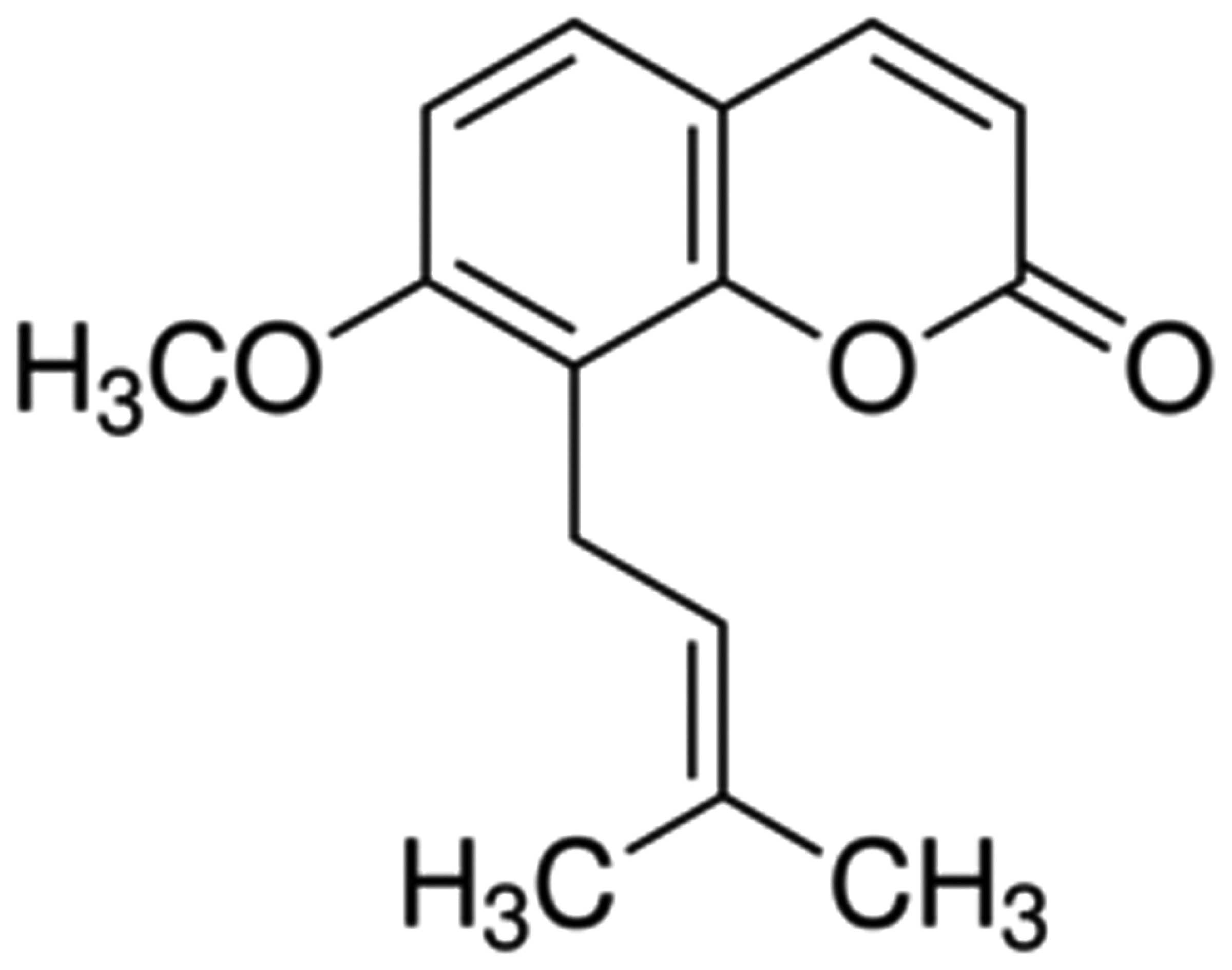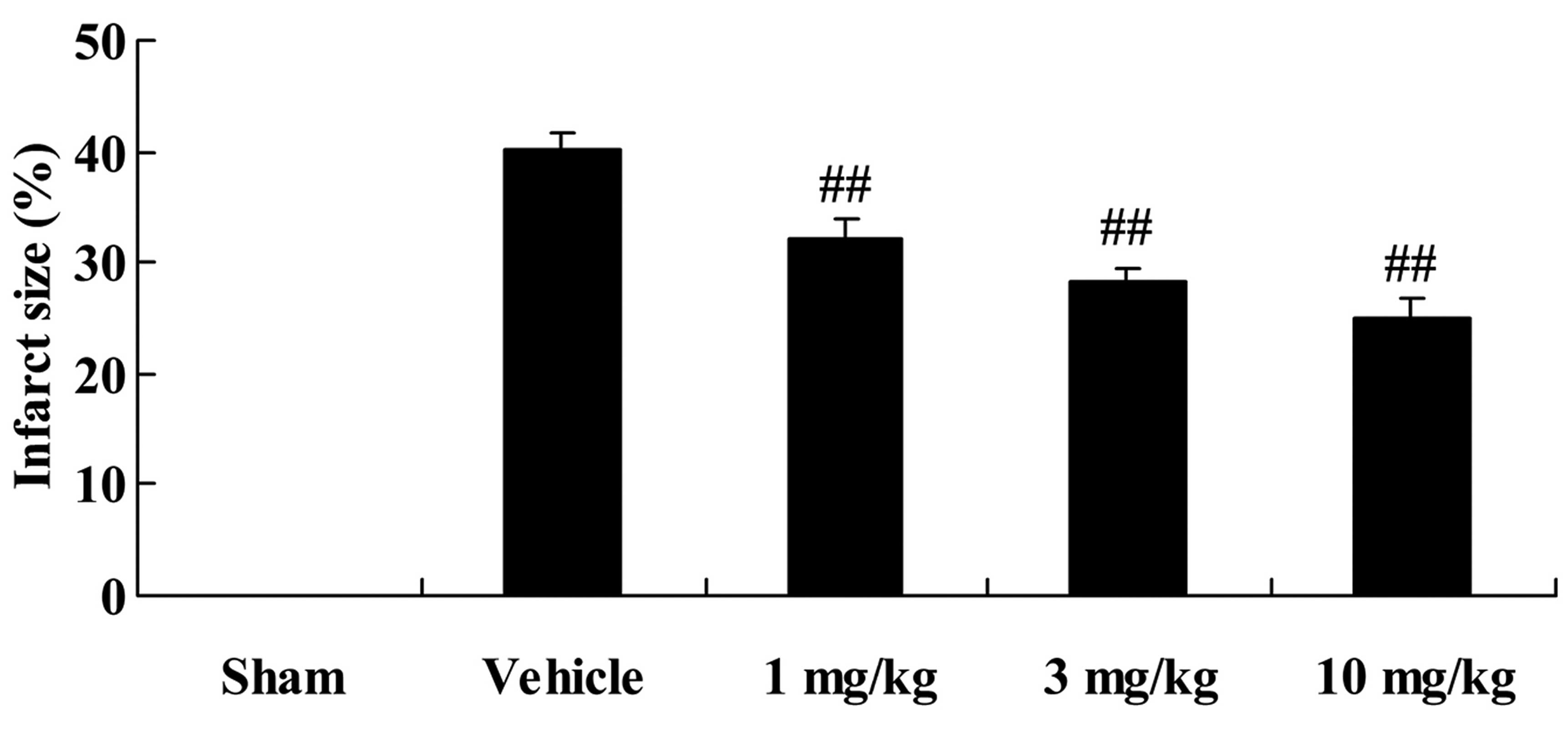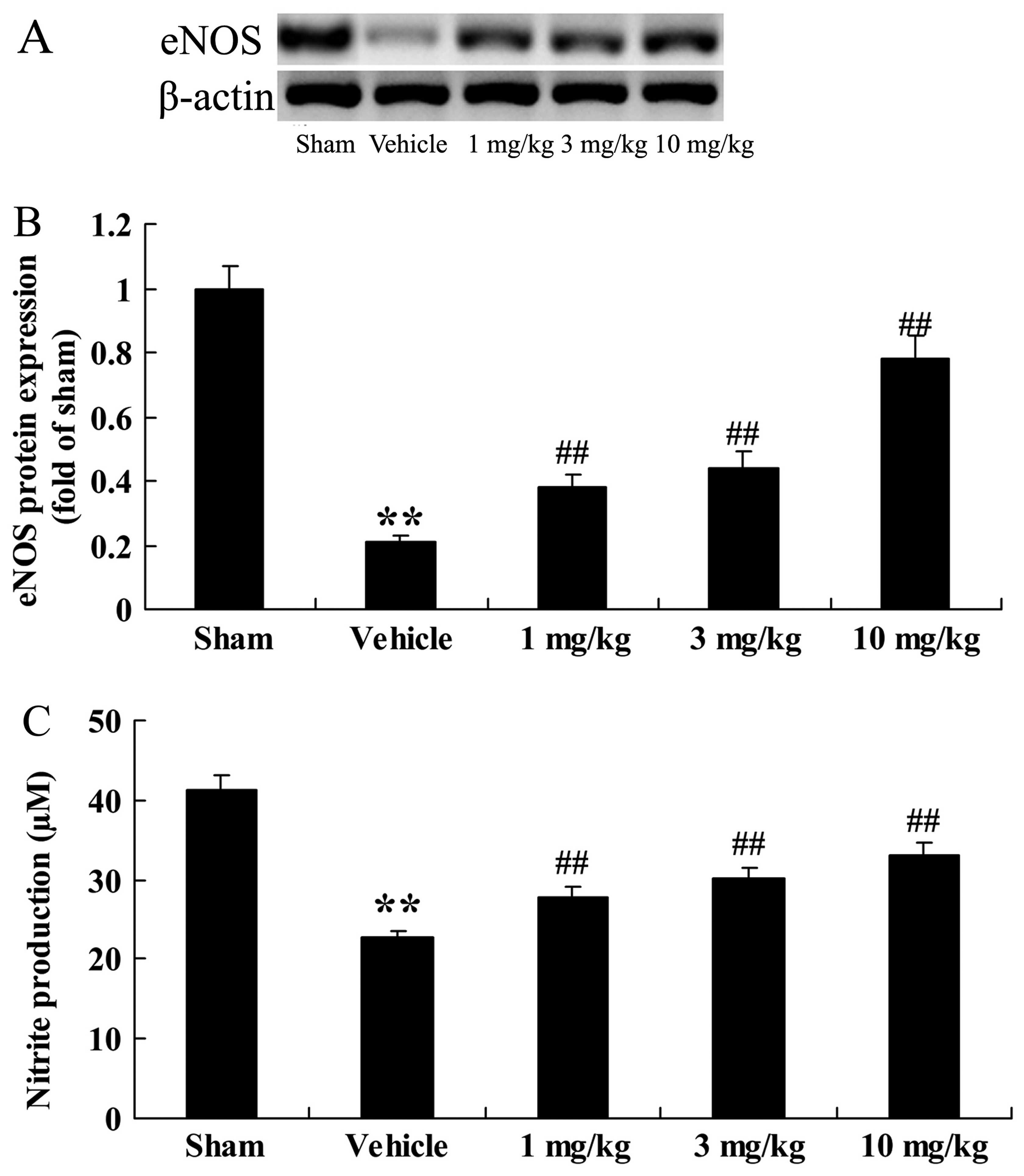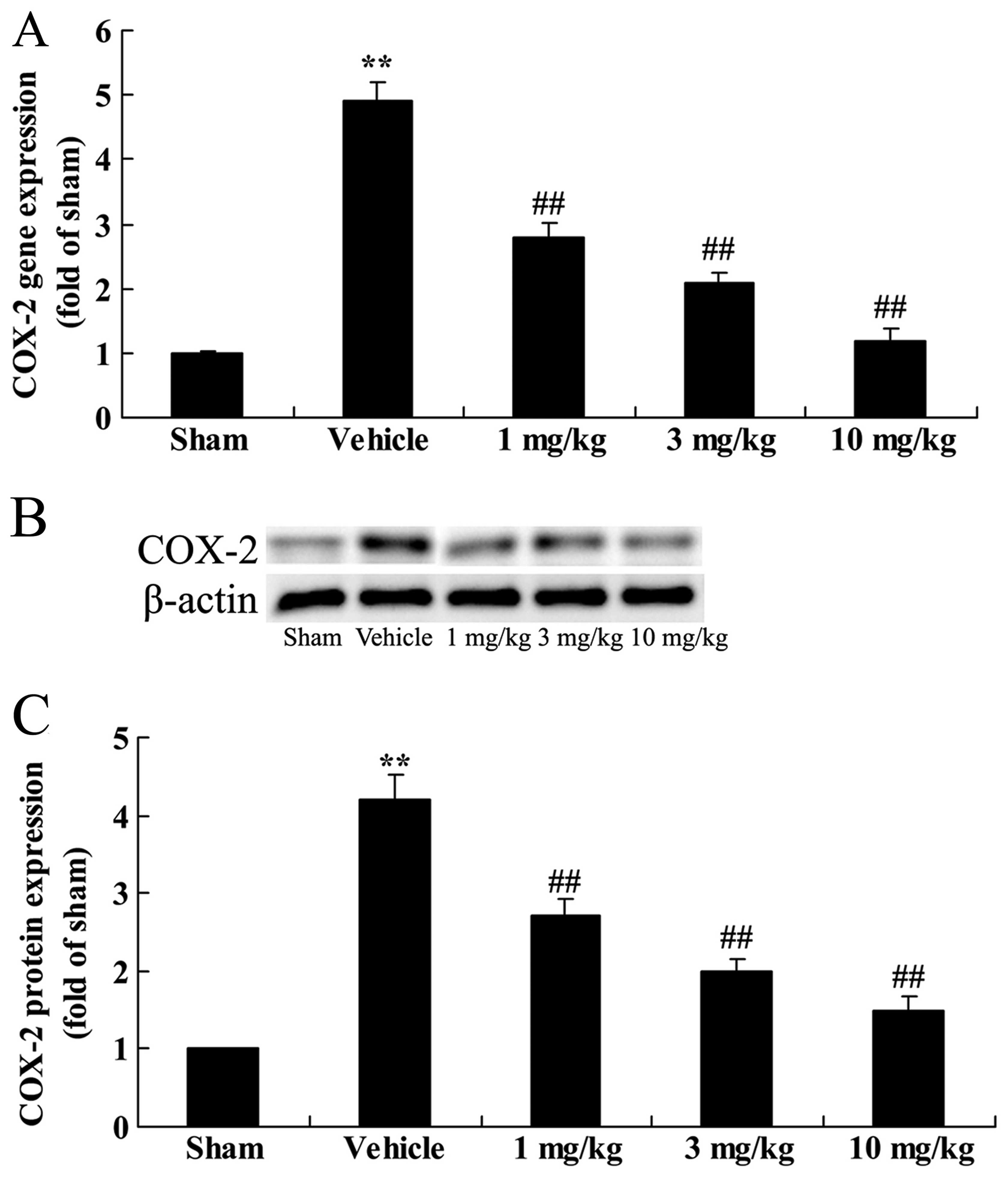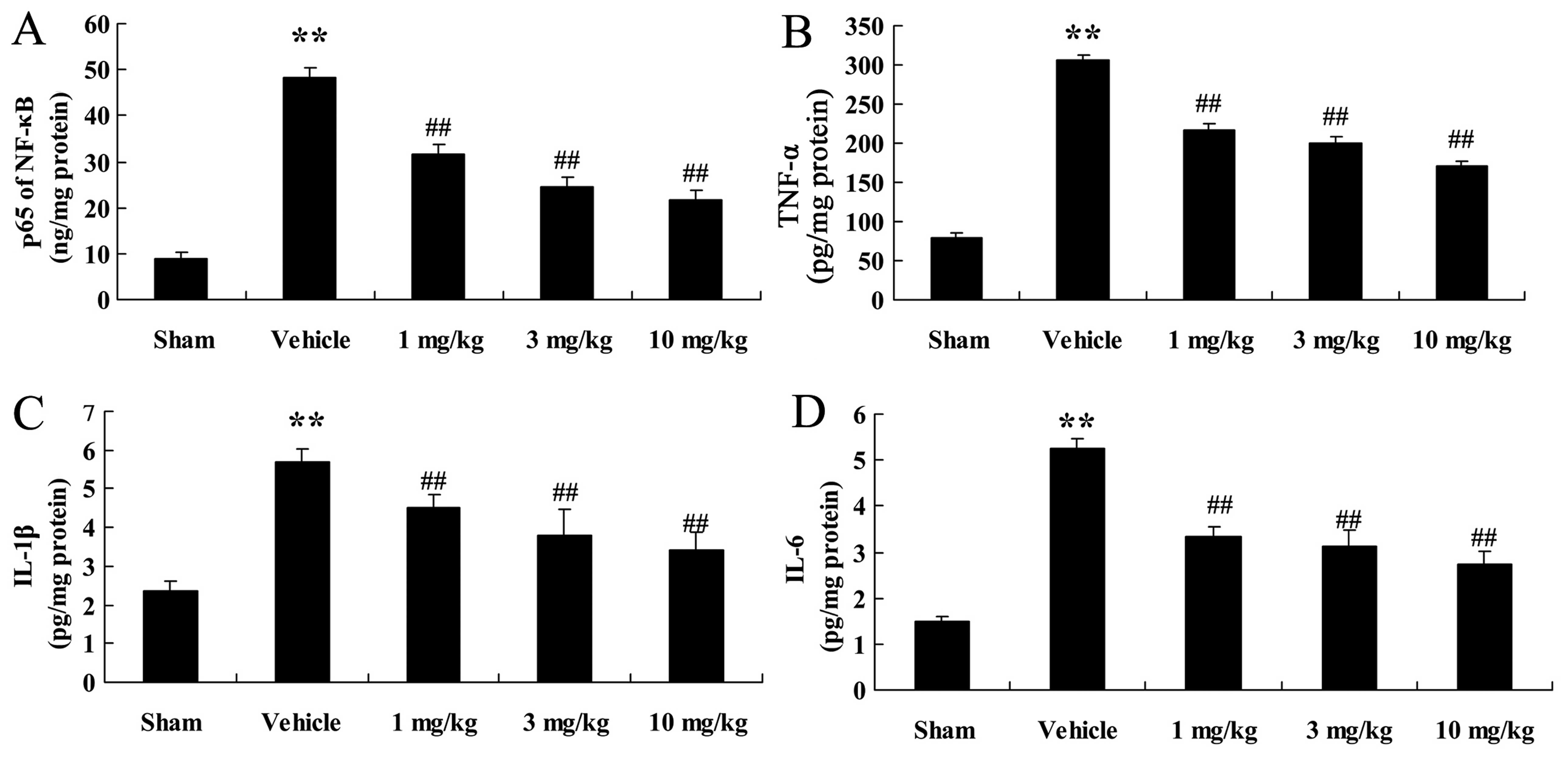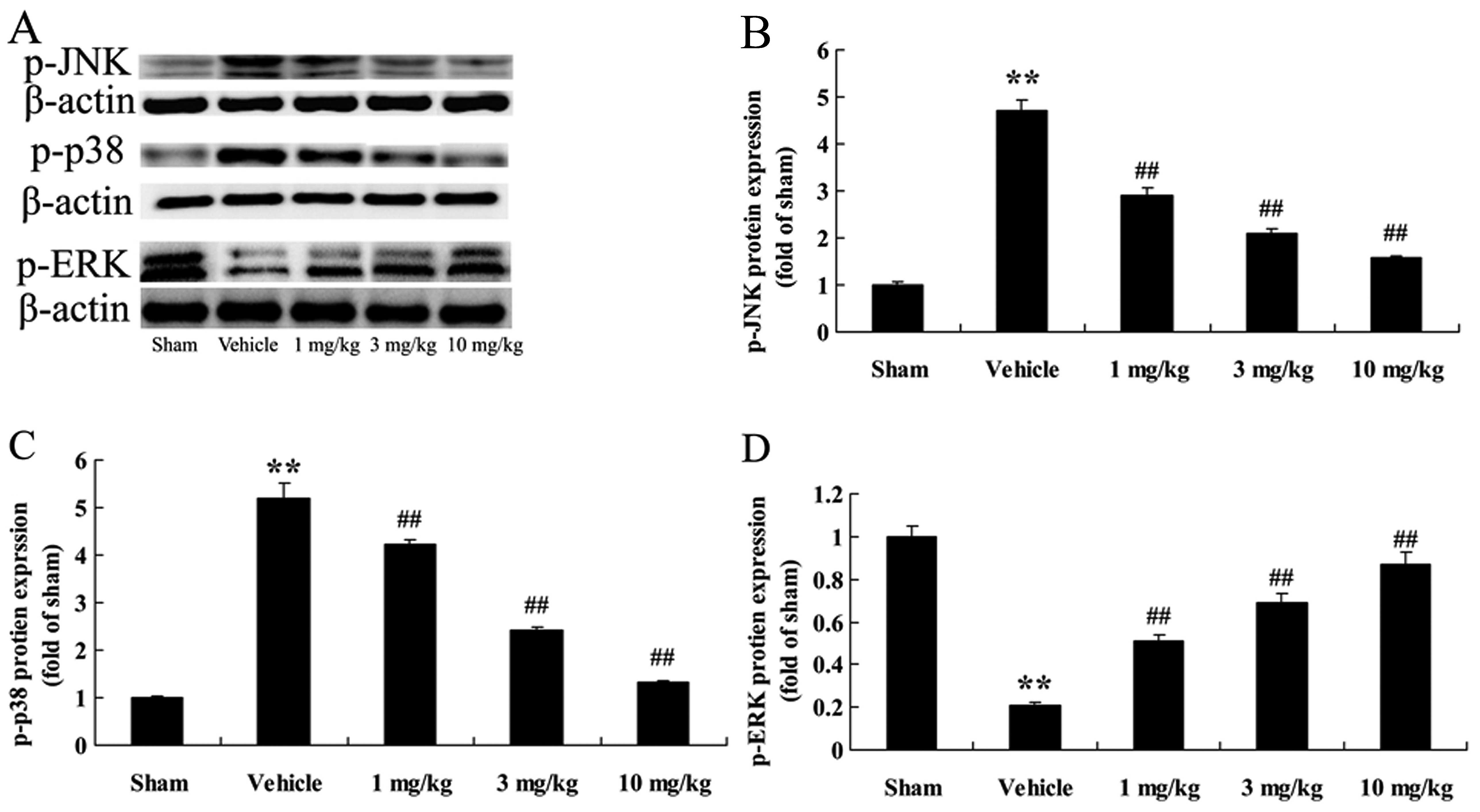|
1
|
Bradshaw PJ, Trafalski S, Hung J, Briffa
TG and Einarsdóttir K: Outcomes after first percutaneous coronary
intervention for acute myocardial infarction according to patient
funding source. BMC Health Serv Res. 14:4052014. View Article : Google Scholar : PubMed/NCBI
|
|
2
|
Go AS, Mozaffarian D, Roger VL, Benjamin
EJ, Berry JD, Blaha MJ, Dai S, Ford ES, Fox CS, Franco S, et al:
Heart disease and stroke statistics - 2014 update: a report from
the American Heart Association. Circulation. 129:e28–e292. 2014.
View Article : Google Scholar
|
|
3
|
Wollenweber T, Roentgen P, Schäfer A,
Schatka I, Zwadlo C, Brunkhorst T, Berding G, Bauersachs J and
Bengel FM: Characterizing the inflammatory tissue response to acute
myocardial infarction by clinical multimodality noninvasive
imaging. Circ Cardiovasc Imaging. 7:811–818. 2014. View Article : Google Scholar : PubMed/NCBI
|
|
4
|
Könnecke H and Bechmann I: The role of
microglia and matrix metalloproteinases involvement in
neuroinflammation and gliomas. Clin Dev Immunol. 2013:9141042013.
View Article : Google Scholar : PubMed/NCBI
|
|
5
|
Squire IB, Evans J, Ng LL, Loftus IM and
Thompson MM: Plasma MMP-9 and MMP-2 following acute myocardial
infarction in man: correlation with echocardiographic and
neurohumoral parameters of left ventricular dysfunction. J Card
Fail. 10:328–333. 2004. View Article : Google Scholar : PubMed/NCBI
|
|
6
|
Schaeffer HJ and Weber MJ:
Mitogen-activated protein kinases: specific messages from
ubiquitous messengers. Mol Cell Biol. 19:2435–2444. 1999.
View Article : Google Scholar : PubMed/NCBI
|
|
7
|
Yue TL, Wang C, Gu JL, Ma XL, Kumar S, Lee
JC, Feuerstein GZ, Thomas H, Maleeff B and Ohlstein EH: Inhibition
of extracellular signal-regulated kinase enhances
Ischemia/Reoxygenation-induced apoptosis in cultured cardiac
myocytes and exaggerates reperfusion injury in isolated perfused
heart. Circ Res. 86:692–699. 2000. View Article : Google Scholar : PubMed/NCBI
|
|
8
|
Aikawa R, Komuro I, Yamazaki T, Zou Y,
Kudoh S, Tanaka M, Shiojima I, Hiroi Y and Yazaki Y: Oxidative
stress activates extracellular signal-regulated kinases through Src
and Ras in cultured cardiac myocytes of neonatal rats. J Clin
Invest. 100:1813–1821. 1997. View Article : Google Scholar : PubMed/NCBI
|
|
9
|
Wang Y, Su B, Sah VP, Brown JH, Han J and
Chien KR: Cardiac hypertrophy induced by mitogen-activated protein
kinase kinase 7, a specific activator for c-Jun NH2-terminal kinase
in ventricular muscle cells. J Biol Chem. 273:5423–5426. 1998.
View Article : Google Scholar : PubMed/NCBI
|
|
10
|
Mackay K and Mochly-Rosen D: An inhibitor
of p38 mitogen-activated protein kinase protects neonatal cardiac
myocytes from ischemia. J Biol Chem. 274:6272–6279. 1999.
View Article : Google Scholar : PubMed/NCBI
|
|
11
|
Nam HH, Jun DW, Jeon HJ, Lee JS, Saeed WK
and Kim EK: Osthol attenuates hepatic steatosis via decreased
triglyceride synthesis not by insulin resistance. World J
Gastroenterol. 20:11753–11761. 2014. View Article : Google Scholar : PubMed/NCBI
|
|
12
|
Chen R, Xue J and Xie M: Osthole regulates
TGF-β1 and MMP-2/9 expressions via activation of PPARα/γ in
cultured mouse cardiac fibroblasts stimulated with angiotensin II.
J Pharm Pharm Sci. 16:732–741. 2013.
|
|
13
|
Yu HP, Liu FC, Tsai YF and Hwang TL:
Osthole attenuates hepatic injury in a rodent model of
trauma-hemorrhage. PLoS One. 8:e659162013. View Article : Google Scholar : PubMed/NCBI
|
|
14
|
Wang XY, Dong WP, Bi SH, Pan ZG, Yu H,
Wang XW, Ma T, Wang J and Zhang WD: Protective effects of osthole
against myocardial ischemia/reperfusion injury in rats. Int J Mol
Med. 32:365–372. 2013.PubMed/NCBI
|
|
15
|
Hoda MN, Li W, Ahmad A, Ogbi S, Zemskova
MA, Johnson MH, Ergul A, Hill WD, Hess DC and Sazonova IY:
Sex-independent neuroprotection with minocycline after experimental
thromboembolic stroke. Exp Transl Stroke Med. 3:162011. View Article : Google Scholar : PubMed/NCBI
|
|
16
|
Hoda MN, Siddiqui S, Herberg S,
Periyasamy-Thandavan S, Bhatia K, Hafez SS, Johnson MH, Hill WD,
Ergul A, Fagan SC, et al: Remote ischemic perconditioning is
effective alone and in combination with intravenous tissue-type
plasminogen activator in murine model of embolic stroke. Stroke.
43:2794–2799. 2012. View Article : Google Scholar : PubMed/NCBI
|
|
17
|
Kilickesmez KO, Bingöl G, Bulut L, Sinan
UY, Abaci O, Ersanli M and Gurmen T: Relationship between serum
endothelin-1 level and spontaneous reperfusion in patients with
acute myocardial infarction. Coron Artery Dis. 26:37–41. 2015.
View Article : Google Scholar
|
|
18
|
Dziewierz A, Rakowski T and Dudek D:
Abciximab in the management of acute myocardial infarction with
ST-segment elevation: evidence-based treatment, current clinical
use, and future perspectives. Ther Clin Risk Manag. 10:567–576.
2014. View Article : Google Scholar : PubMed/NCBI
|
|
19
|
Wei M, Mo SL, Nabar NR, Chen Y, Zhang JJ,
He QL, Zou XN, Liu XG, Sun LB and Zhou SF: Modification of rat
model of sciatica induced by lumber disc herniation and the
anti-inflammatory effect of osthole given by epidural
catheterization. Pharmacology. 90:251–263. 2012. View Article : Google Scholar : PubMed/NCBI
|
|
20
|
Yang G, Fang Z, Liu Y, Zhang H, Shi X, Ji
Q, Lin Q and Lin R: Protective effects of Chinese traditional
medicine buyang huanwu decoction on myocardial injury. Evid Based
Complement Alternat Med. 2011:9303242011. View Article : Google Scholar :
|
|
21
|
Balligand JL and Cannon PJ: Nitric oxide
synthases and cardiac muscle. Autocrine and paracrine influences.
Arterioscler Thromb Vasc Biol. 17:1846–1858. 1997. View Article : Google Scholar : PubMed/NCBI
|
|
22
|
Sumeray MS, Rees DD and Yellon DM: Infarct
size and nitric oxide synthase in murine myocardium. J Mol Cell
Cardiol. 32:35–42. 2000. View Article : Google Scholar : PubMed/NCBI
|
|
23
|
Yao L, Lu P, Li Y, Yang L, Feng H, Huang
Y, Zhang D, Chen J and Zhu D: Osthole relaxes pulmonary arteries
through endothelial phosphatidylinositol 3-kinase/Akt-eNOS-NO
signaling pathway in rats. Eur J Pharmacol. 699:23–32. 2013.
View Article : Google Scholar
|
|
24
|
Yang SM, Chan YL, Hua KF, Chang JM, Chen
HL, Tsai YJ, Hsu YJ, Chao LK, Feng-Ling Y, Tsai YL, et al: Osthole
improves an accelerated focal segmental glomerulosclerosis model in
the early stage by activating the Nrf2 antioxidant pathway and
subsequently inhibiting NF-κB-mediated COX-2 expression and
apoptosis. Free Radic Biol Med. 73:260–269. 2014. View Article : Google Scholar : PubMed/NCBI
|
|
25
|
Stein A, Mohr F, Laux M, Thieme S, Lorenz
B, Cetindis M, Hackl J, Groha P, Demetz G, Schulz S, et al:
Erythropoietin-induced progenitor cell mobilisation in patients
with acute ST-segment-elevation myocardial infarction and
restenosis. Thromb Haemost. 107:769–774. 2012. View Article : Google Scholar : PubMed/NCBI
|
|
26
|
Turner NA, Das A, Warburton P, O'Regan DJ,
Ball SG and Porter KE: Interleukin-1alpha stimulates
proinflammatory cytokine expression in human cardiac
myofibroblasts. Am J Physiol Heart Circ Physiol. 297:H1117–H1127.
2009. View Article : Google Scholar : PubMed/NCBI
|
|
27
|
Zheng Y, Lu M, Ma L, Zhang S, Qiu M and Ma
X: Osthole ameliorates renal ischemia-reperfusion injury by
inhibiting inflammatory response. Urol Int. 91:350–356. 2013.
View Article : Google Scholar : PubMed/NCBI
|
|
28
|
Chao X, Zhou J, Chen T, Liu W, Dong W, Qu
Y, Jiang X, Ji X, Zhen H and Fei Z: Neuroprotective effect of
osthole against acute ischemic stroke on middle cerebral ischemia
occlusion in rats. Brain Res. 1363:206–211. 2010. View Article : Google Scholar : PubMed/NCBI
|
|
29
|
Wang KF, Huang PH, Chiang CH, Hsu CY, Leu
HB, Chen JW and Lin SJ: Usefulness of plasma matrix
metalloproteinase-9 level in predicting future coronary
revascularization in patients after acute myocardial infarction.
Coron Artery Dis. 24:23–28. 2013. View Article : Google Scholar
|
|
30
|
Periasamy S, Mo FE, Chen SY, Chang CC and
Liu MY: Sesamol attenuates isoproterenol-induced acute myocardial
infarction via inhibition of matrix metalloproteinase-2 and -9
expression in rats. Cell Physiol Biochem. 27:273–280. 2011.
View Article : Google Scholar : PubMed/NCBI
|
|
31
|
Dai F, Xiao GL and Pan J: Correlation
between serum MMP-2 and MMP-9 in patients with acute myocardial
infarction before and after PCI. Xi Bao Yu Fen Zi Mian Yi Xue Za
Zhi. 25:716–718. 2009.In Chinese. PubMed/NCBI
|
|
32
|
Xu XM, Zhang Y, Qu D, Feng XW, Chen Y and
Zhao L: Osthole suppresses migration and invasion of A549 human
lung cancer cells through inhibition of matrix metalloproteinase-2
and matrix metallopeptidase-9 in vitro. Mol Med Rep. 6:1018–1022.
2012.PubMed/NCBI
|
|
33
|
Yang D, Gu T, Wang T, Tang Q and Ma C:
Effects of osthole on migration and invasion in breast cancer
cells. Biosci Biotechnol Biochem. 74:1430–1434. 2010. View Article : Google Scholar : PubMed/NCBI
|
|
34
|
Liu X, Gu J, Fan Y, Shi H and Jiang M:
Baicalin attenuates acute myocardial infarction of rats via
mediating the mitogen-activated protein kinase pathway. Biol Pharm
Bull. 36:988–994. 2013. View Article : Google Scholar : PubMed/NCBI
|
|
35
|
Shimada K, Nakamura M, Ishida E, Kishi M
and Konishi N: Roles of p38- and c-jun NH2-terminal kinase-mediated
pathways in 2-methoxyestradiol-induced p53 induction and apoptosis.
Carcinogenesis. 24:1067–1075. 2003. View Article : Google Scholar : PubMed/NCBI
|
|
36
|
Hreniuk D, Garay M, Gaarde W, Monia BP,
McKay RA and Cioffi CL: Inhibition of c-Jun N-terminal kinase 1,
but not c-Jun N-terminal kinase 2, suppresses apoptosis induced by
ischemia/reoxygenation in rat cardiac myocytes. Mol Pharmacol.
59:867–874. 2001.PubMed/NCBI
|
|
37
|
Barancik M, Htun P, Strohm C, Kilian S and
Schaper W: Inhibition of the cardiac p38-MAPK pathway by SB203580
delays ischemic cell death. J Cardiovasc Pharmacol. 35:474–483.
2000. View Article : Google Scholar : PubMed/NCBI
|
|
38
|
Wang W, Xu J and Li L, Wang P, Ji X, Ai H,
Zhang L and Li L: Neuroprotective effect of morroniside on focal
cerebral ischemia in rats. Brain Res Bull. 83:196–201. 2010.
View Article : Google Scholar : PubMed/NCBI
|
|
39
|
Tanaka M, Mokhtari GK, Terry RD, Balsam
LB, Lee KH, Kofidis T, Tsao PS and Robbins RC: Overexpression of
human copper/zinc superoxide dismutase (SOD1) suppresses
ischemia-reperfusion injury and subsequent development of graft
coronary artery disease in murine cardiac grafts. Circulation.
110(Suppl 1): II200–II206. 2004. View Article : Google Scholar : PubMed/NCBI
|
|
40
|
Guo J, Li HZ, Wang LC, Zhang WH, Li GW,
Xing WJ, Wang R and Xu CQ: Increased expression of calcium-sensing
receptors in atherosclerosis confers hypersensitivity to acute
myocardial infarction in rats. Mol Cell Biochem. 366:345–354. 2012.
View Article : Google Scholar : PubMed/NCBI
|
|
41
|
Shokoohinia Y, Hosseinzadeh L, Moieni-Arya
M, Mostafaie A and Mohammadi-Motlagh HR: Osthole attenuates
doxorubicin-induced apoptosis in PC12 cells through inhibition of
mitochondrial dysfunction and ROS production. BioMed Res Int.
2014:1568482014. View Article : Google Scholar : PubMed/NCBI
|
|
42
|
Ding Y, Lu X, Hu X, Ma J and Ding H:
Osthole inhibits proliferation and induces apoptosis in human
osteosarcoma cells. Int J Clin Pharmacol Ther. 52:112–117. 2014.
View Article : Google Scholar
|
|
43
|
Zheng Y, Lu M, Ma L, Zhang S, Qiu M and
Wang Y: Osthole ameliorates renal ischemia-reperfusion injury in
rats. J Surg Res. 183:347–354. 2013. View Article : Google Scholar : PubMed/NCBI
|















